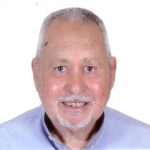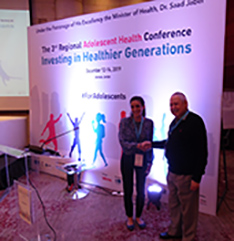 IAAH’s Middle East and North Africa (MENA) Regional Vice President, Mamdouh Wahba, was once again an integral part of the MENA regional conference, held December 12th-14th, 2019 in Amman, Jordan. In partnership with the Royal Health Awareness Society of Jordan, under the Patronage of Jordanian Minister of Health, Wahba and team set to develop a conference that provided a rich scientific program and engaging social events. “We believed that Jordan was the most suitable location for the 3rd MENA regional conference and we are pleased at the resounding success,” said Wahba.
IAAH’s Middle East and North Africa (MENA) Regional Vice President, Mamdouh Wahba, was once again an integral part of the MENA regional conference, held December 12th-14th, 2019 in Amman, Jordan. In partnership with the Royal Health Awareness Society of Jordan, under the Patronage of Jordanian Minister of Health, Wahba and team set to develop a conference that provided a rich scientific program and engaging social events. “We believed that Jordan was the most suitable location for the 3rd MENA regional conference and we are pleased at the resounding success,” said Wahba.
The conference, titled, “Investing in Healthier Generations”, attracted 280 participants from 25 countries and included topics such as prevention of risky behaviors, mental health, reproductive health, and adolescent refugee health. The Jordanian Minister of Health spoke during the opening ceremony and keynote speeches were delivered by a wide range of adolescent health experts, including John Santelli (Columbia University), Valentina Baltag (WO), Montasser Kamal (IDRC), Frederika Maijer (UNFPA), Tomomi Kitamura (UNICEF) with a virtual presentation from EuTEACH’s Pierre-Andre Michaud. National and regional academics and researchers in adolescent health also contributed to the scientific discourse.
 In addition to attending the conference, Professor Jocelyn Dejong of the American University of Beirut headed a declaration drafting committee and through consultations and input with all participants, developed a pragmatic road map for advancing the health and welfare of the 100 million adolescents living in the MENA region. “My hope is that the Arab Coalition of Adolescent Health and Medicine will take this declaration and implement this road map throughout the MENA region,” said Wahba. “Adolescents in the MENA region would greatly benefit from these advancements.”
In addition to attending the conference, Professor Jocelyn Dejong of the American University of Beirut headed a declaration drafting committee and through consultations and input with all participants, developed a pragmatic road map for advancing the health and welfare of the 100 million adolescents living in the MENA region. “My hope is that the Arab Coalition of Adolescent Health and Medicine will take this declaration and implement this road map throughout the MENA region,” said Wahba. “Adolescents in the MENA region would greatly benefit from these advancements.”

Prior to the start of the 3rd MENA regional conference, 30 healthcare providers from 19 Arab countries participated in an inaugural training workshop. This 5-day training program provided healthcare workers with additional training in adolescent health. Faculty providing the training were from the Egyptian Society for Adolescent Medicine (ESAM) and included Mamdouh Wahba, Amani Abou El Soud, Magdy Khaled, Shereen Abdel Ghaffar, Ghada Anwar, and Heba Hafez. “This was an important milestone for the region,” said Wahba. Initial evaluation of the workshop demonstrated high rates of satisfaction and value, increased knowledge, and surpassed expectations from participants. “With such high rates of satisfaction and expanded knowledge, in addition to the known need in the MENA region for additional adolescent health training, we hope to provide this training again,” said Wahba.

 IAAH’s Middle East and North Africa (MENA) Regional Vice President, Mamdouh Wahba, was once again an integral part of the MENA regional conference, held December 12th-14th, 2019 in Amman, Jordan. In partnership with the Royal Health Awareness Society of Jordan, under the Patronage of Jordanian Minister of Health, Wahba and team set to develop a conference that provided a rich scientific program and engaging social events. “We believed that Jordan was the most suitable location for the 3rd MENA regional conference and we are pleased at the resounding success,” said Wahba.
IAAH’s Middle East and North Africa (MENA) Regional Vice President, Mamdouh Wahba, was once again an integral part of the MENA regional conference, held December 12th-14th, 2019 in Amman, Jordan. In partnership with the Royal Health Awareness Society of Jordan, under the Patronage of Jordanian Minister of Health, Wahba and team set to develop a conference that provided a rich scientific program and engaging social events. “We believed that Jordan was the most suitable location for the 3rd MENA regional conference and we are pleased at the resounding success,” said Wahba. In addition to attending the conference, Professor Jocelyn Dejong of the American University of Beirut headed a declaration drafting committee and through consultations and input with all participants, developed a pragmatic road map for advancing the health and welfare of the 100 million adolescents living in the MENA region. “My hope is that the Arab Coalition of Adolescent Health and Medicine will take this declaration and implement this road map throughout the MENA region,” said Wahba. “Adolescents in the MENA region would greatly benefit from these advancements.”
In addition to attending the conference, Professor Jocelyn Dejong of the American University of Beirut headed a declaration drafting committee and through consultations and input with all participants, developed a pragmatic road map for advancing the health and welfare of the 100 million adolescents living in the MENA region. “My hope is that the Arab Coalition of Adolescent Health and Medicine will take this declaration and implement this road map throughout the MENA region,” said Wahba. “Adolescents in the MENA region would greatly benefit from these advancements.”